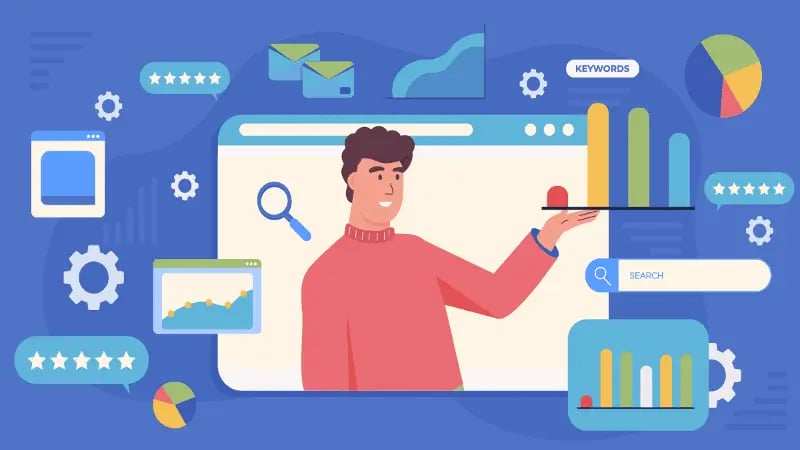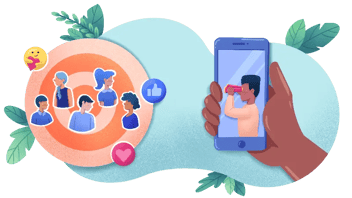What is Business Development, and Why is it Important?
What is Business Development? Imagine a company doubling its revenue in a single year, not through lucky breaks but strategic alliances. That's the power of business development.
But it's more than just sales; it's the engine of sustainable growth, driving revenue, expanding reach, and fueling innovation. Understanding its true definition and strategic importance is crucial for unlocking its transformative potential.
What is Business Development? Beyond the Buzzword
So, what is business development, exactly? While the term gets thrown around a lot, a clear business development definition is essential for understanding its true potential. Business development, or BD, is the process of creating long-term value for a business through strategic initiatives. It goes far beyond simply closing deals; it encompasses a range of activities aimed at fostering sustainable growth.
It's crucial to understand what BD isn't. It's not just sales. Sales typically focuses on short-term transactions, closing deals, and hitting quotas. While sales is a vital function, it's just one piece of the puzzle. Business development, on the other hand, takes a longer view. It's about building lasting relationships, identifying new opportunities, and creating value that extends far beyond a single transaction. Think of sales as planting individual trees, while business development is cultivating the entire orchard.
Business development is multifaceted, encompassing several key areas:
-
Strategic partnerships: Collaborating with other companies can create synergistic opportunities that neither company could achieve alone. These partnerships can take many forms, from joint ventures to distribution agreements. A classic example is the partnership between a software company and a hardware manufacturer. The software company gains access to a broader market through the hardware manufacturer's distribution channels, while the hardware company can offer its customers a more complete solution. This kind of synchronization is a hallmark of effective business development.
-
Marketing: BD and marketing work hand-in-hand. Business development professionals often rely on marketing insights to identify new markets and customer segments. Conversely, BD initiatives can inform marketing strategies by highlighting emerging trends and unmet needs. For instance, feedback gathered through strategic partnerships might reveal a demand for a new product feature, which marketing can then promote.
-
Product development: Business development plays a crucial role in shaping product strategy. By staying close to the market and understanding customer needs, BD professionals can provide valuable insights to product development teams. They can identify gaps in the market, anticipate future trends, and help prioritize product features that will resonate with customers. This ensures that product development efforts are aligned with market demand and have the best chance of success.
Beyond these core functions, business development can also involve other critical areas, depending on the specific industry and business. These might include market research and competitive analysis to understand the landscape, investor relations to secure funding for growth initiatives, or even government relations to navigate regulatory environments. What is BD's role in these areas? It's about identifying opportunities and building relationships that support the overall business strategy.
In short, business development is a holistic approach to building long-term value. It's about creating strategic alliances, understanding market dynamics, and driving innovation. By understanding the true business development definition and moving beyond the misconception that BD is simply sales, businesses can unlock its transformative potential and achieve sustainable growth.
Differentiating Business Development From Sales
While they often work in tandem, it's crucial to remember that business development and sales are distinct functions with different objectives and approaches. The core difference lies in their focus: sales prioritizes immediate transactions, while BD focuses on long-term value creation and relationship building.
Think of it this way: sales is a sprint, while business development is a marathon. Sales aims to close deals quickly and efficiently, hitting targets and generating revenue in the short term. On the other hand, business development plays the long game, cultivating relationships, exploring new markets, and creating strategic partnerships that will yield benefits for years to come.
| Feature | Sales | Business Development |
| Primary focus | Closing deals | Building relationships |
| Time Horizon | Short-term | Long-term |
| Metrics | Revenue, conversion rates | Market share, partnerships, new market entry |
| Activities | Product demos, negotiations, closing deals | Identifying partners, market research, strategic planning |
For example, a salesperson might focus on giving product demos, negotiating prices, and closing deals with individual customers. In contrast, a business development professional might be busy identifying potential strategic partners, conducting market research to understand emerging trends, or developing a long-term plan for entering a new geographic region.
Though distinct, sales and BD are not mutually exclusive. In fact, they can work together synergistically to achieve business objectives. BD can create new opportunities and open doors for sales, while sales can provide valuable feedback and insights to inform BD strategies. For example, a BD professional might identify a potential partnership that leads to a new distribution channel. The sales team can then leverage this new channel to reach a wider audience and close more deals. Conversely, feedback from the sales team about customer needs and market trends can help BD professionals identify new opportunities for product development or market expansion.
Ultimately, the most successful businesses understand the importance of both sales and BD, recognizing their distinct roles and leveraging their combined power to drive sustainable growth.
The Importance of BD: Fueling Business Growth
The importance of BD cannot be overstated. Effective business development is a powerful engine for business growth, driving revenue generation, expanding market reach, and fostering innovation. It's the strategic fuel that propels companies toward long-term success.
Driving Revenue Growth
One of the most significant ways BD contributes to business growth is through revenue generation. Companies with well-defined BD strategies see demonstrably higher revenue growth. While precise figures vary across industries, studies suggest that businesses with robust BD functions experience significantly higher revenue growth compared to those without. This isn't just about closing a few extra deals; it's about creating sustainable revenue streams through strategic partnerships, new market penetration, and innovative product offerings.
For example, a company might partner with a distributor in a new geographic region, instantly gaining access to a previously untapped customer base. This kind of strategic move, facilitated by BD, can lead to substantial and sustained increases in revenue.
Expanding Market Reach
Beyond revenue, BD plays a crucial role in expanding market reach. Entering new markets can be challenging, but business development can smooth the path. Strategic partnerships can provide access to established distribution networks, local expertise, and existing customer relationships.
Consider how a tech company might partner with a local telecommunications provider to expand its services into a new country. This partnership allows the tech company to bypass the complexities of setting up its own infrastructure and navigating unfamiliar regulations, significantly accelerating its market entry. Targeted marketing efforts, guided by BD insights, can further amplify this expansion.
Fostering Innovation
Furthermore, BD is a vital catalyst for innovation. Collaborations and partnerships bring together diverse perspectives, expertise, and resources, creating a fertile ground for new ideas to flourish. When companies work together, they can leverage each other's strengths and overcome limitations.
For example, a pharmaceutical company might partner with a research university to develop a new drug. The university provides cutting-edge research capabilities, while the pharmaceutical company provides the resources and expertise to bring the drug to market. This type of collaboration, driven by BD, can lead to breakthroughs that would be impossible to achieve alone.
Consider the rise of open innovation, where companies actively seek external partners to collaborate on research and development. This trend underscores the growing importance of BD in driving innovation.
Building Brand Awareness and Credibility
Finally, business development contributes significantly to building brand awareness and credibility. By forging partnerships with reputable organizations, businesses can enhance their own image and reputation. For example, a startup that partners with an established industry leader gains instant credibility and access to a wider audience.
These partnerships serve as a powerful signal to potential customers, investors, and other stakeholders, demonstrating the company's value and potential. Participating in industry events and conferences, facilitated by BD, can further enhance brand visibility and create valuable networking opportunities.
The significance of BD is clear. It's not just about short-term gains; it's about building a foundation for sustainable business growth. Through strategic partnerships, market expansion, innovation, and brand building, business development fuels the long-term success of any organization.
Business Development Strategies for Different Business Sizes
Business development strategies are not one-size-fits-all. The most effective approach will vary depending on the size and stage of the business. Startups, SMEs, and large corporations each require tailored strategies to maximize their growth potential.
Startups: Agility and Early Adoption
For startups, agility is key. BD efforts should focus on rapid experimentation, iterative learning, and building relationships with early adopters. Networking is crucial; attending industry events, joining online communities, and actively engaging with potential customers and partners are essential activities.
Startups often benefit from partnering with complementary businesses, even if they are small, to expand their reach and access new customer segments. A successful startup BD strategy might involve offering early access or beta versions of their product to key influencers or potential customers in exchange for feedback and testimonials.
This approach not only helps refine the product but also generates buzz and builds a community around the brand. Another effective strategy is to focus on building strategic relationships with venture capitalists and angel investors, which can provide not only funding but also valuable mentorship and connections.
SMBs: Targeted Partnerships and Local Focus
Small-medium businesses (SMBs) often have limited resources, so their BD strategies need to be highly targeted. Focus on local market penetration and building strong relationships with key customers and partners in the region. Targeted partnerships with complementary businesses can be particularly effective.
For example, a local bakery might partner with a nearby coffee shop to offer bundled deals or cross-promotional activities. Customer retention is also crucial for SBMs. Building a loyal customer base through excellent service and personalized engagement can generate repeat business and referrals, which are invaluable for sustainable growth. Joining local business associations and chambers of commerce can provide access to networking opportunities and resources specific to the SMBs' region.
Large Corporations: Strategic Alliances and Global Expansion
Large corporations have the resources and reach to pursue more complex BD strategies. Strategic alliances, mergers and acquisitions, and global market expansion are common tactics. Strategic alliances can allow large corporations to enter new markets or access new technologies without having to build them from scratch.
Mergers and acquisitions can consolidate market share, acquire valuable assets, or expand into new business areas. Global market expansion requires careful planning and execution, often involving partnerships with local companies to navigate regulatory and cultural differences. Large corporations often have dedicated BD teams that focus on identifying and evaluating potential opportunities, negotiating deals, and managing ongoing relationships.
For instance, a large technology company might acquire a smaller company with innovative AI technology to integrate into its existing product offerings, or it might form a strategic alliance with a telecommunications giant to expand its cloud services into a new geographic market. These types of large-scale initiatives require a structured and strategic approach to BD.
The Transformative Power of Effective Business Development
Effective business development is more than just a strategy; it's a catalyst for transformation. By focusing on long-term value creation, strategic partnerships, and market expansion, businesses can unlock their full potential and achieve sustainable growth.
A strong BD strategy drives revenue generation, expands market reach, fosters innovation, and builds brand credibility. It's the engine that propels businesses toward a future of limitless possibilities.
Ready to unlock the full potential of your business and embark on a journey of strategic growth? Contact Aspiration Marketing today to explore how we can help you develop and implement a winning business development strategy.
This content is also available in:
- Deutsch: Was ist Geschäftsentwicklung, und warum ist sie wichtig?
- Español: ¿Qué es el desarrollo empresarial y por qué es importante?
- Français: Le développement des entreprises et pourquoi est-il important?
- Italiano: Che cos'è lo sviluppo del business e perché è importante?
- Română: Ce este dezvoltarea afacerilor și de ce este importantă?
- 简体中文: 什么是业务发展,为什么它很重要?

Joachim is a certified HubSpot trainer with over 13 years of experience in content marketing, strategy, website development, and SEO. He has implemented numerous large-scale, international growth marketing programs, including one with UiPath, which grew from a startup to a successful IPO on the NYSE. Joachim has special expertise in multilingual marketing and sales enablement projects, and he uses the latest AI technologies to help our clients.









Leave a Comment